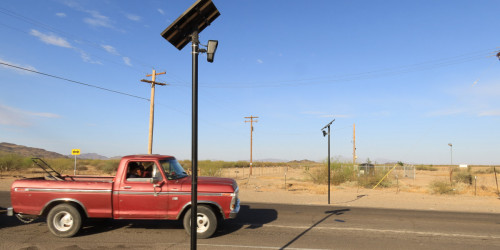Under a California law that went into effect on January 1, 2020, all law enforcement training materials must be “conspicuously” published on the California Commission on Peace Officer Standards and Training (POST) website.
However, if you visit POST’s Open Data hub and try to download the officer training materials relating to face recognition technology or automated license plate readers (ALPRs), or the California Peace Officers Association’s course on use of force, you will receive only a Word document with a single sentence:

This is unlawful, and unacceptable, EFF told POST in a letter submitted today. Under the new California law, SB 978, POST must post law enforcement training materials online if the materials would be available to the public under the California Public Records Act. Copyrighted material is available to the public under the California Public Records Act—in fact, EFF obtained a full, unredacted copy of POST’s ALPR training through a records request just last year.
The company that creates POST’s courses on ALPR and face recognition is the same company that sells the technology: Vigilant Solutions (now a subsidiary of Motorola Solutions). This company has a long history of including non-publication clauses in its contracts with law enforcement as a means to control its intellectual property. But, as we explain in our letter, SB 978 is clear: copyright law is not a valid excuse for POST to evade its transparency obligations.
And what’s just as bad is that even when copyright isn’t an issue, POST has only released training course outlines, and not the training materials themselves. Indeed, POST has made no training materials about the use of force available, sharing only the outlines. With police use of force currently a hotly debated issue throughout the state and nation, it is all the more concerning that POST is unlawfully hiding this material.
SB 978 was sponsored by California State Senator Steven Bradford and supported by EFF and a number of civil rights groups in order to create a new level of transparency and public accountability.
When EFF obtained the ALPR training last year, we found that Vigilant Solutions’ training was gravely outdated, included incorrect information, and raised questions about whether the presentation served the company’s commercial interests more than the public’s. EFF called on POST to suspend the course. However, since POST has not published the current training materials, the public does not yet know whether these problems have been adequately addressed.
Our elected officials can pass laws regulating the police, and watchdog bodies can review law enforcement policies, but if training materials are kept secret, it provides a back door for manufacturers of surveillance technology and private organizations to influence police practices without oversight or accountability.
If California POST is going to set and uphold police standards, then it cannot ignore the law. POST must make its training materials available online immediately.











